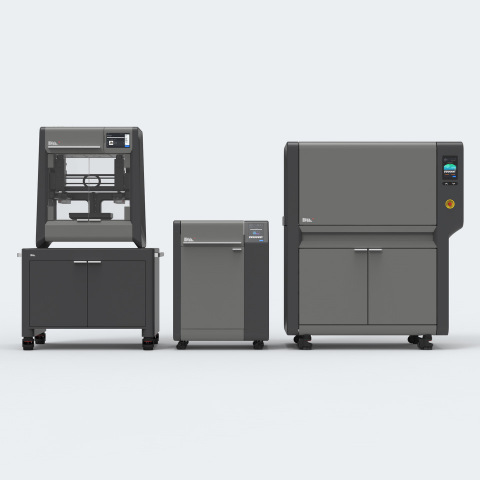Desktop Metal Expands Metal Portfolio With Launch of 4140 Chromoly Steel for Industrial Applications
Studio System users now will be able to 3D print couplings, connecting rods, pump shafts, pinions, worm gears and more
BURLINGTON, Mass.--(BUSINESS WIRE)-- Desktop Metal, the company committed to making 3D printing accessible to engineers and manufacturers, today announced the launch of 4140 chromoly steel for the Studio System™, the world’s first office-friendly metal 3D printing system for prototyping and low volume production. One of the most versatile chromoly steels, 4140 is characterized by its toughness, high tensile strength, and abrasion and impact resistance, making it a key all-purpose steel for industrial applications.
This press release features multimedia. View the full release here: https://www.businesswire.com/news/home/20191112005179/en/

Desktop Metal Expands Metal Portfolio With Launch of 4140 Chromoly Steel for Industrial Applications (Photo: Business Wire)
“As global demand for the Studio System grows, Desktop Metal is broadening its materials portfolio to include 4140 chromoly steel, enabling designers and engineers to print a broad variety of critical industrial applications, such as couplings, forks, pinions, pump shafts, sprockets, torsion bars, worm gears, connecting rods, and fasteners,” said Ric Fulop, CEO and co-founder of Desktop Metal. “Now, teams around the world will be able to leverage the Studio System to iterate quickly on 4140 prototypes and ultimately produce end-use, customer-ready parts faster and more cost-effectively.”
Early applications of 4140 parts printed with the Studio System illustrate the benefits across a variety of industries, including automotive, oil and gas, pumps and hydraulics, agriculture and defense, among others:
Automotive: Connecting Rod
A key component in combustion engines, connecting rods are used to connect a piston head to a crankshaft. During combustion, connecting rods experience significant loads and must endure high temperatures, so functional testing must be conducted using metal parts. 4140 is a key material choice for this application as it can withstand the high temperatures and mechanical stresses experienced by connecting rods. With the Studio System, users have the ability to create functional prototypes in a matter of days, and then rapidly iterate on those designs. This ensures engineers can develop efficient components and validate how they perform before committing to the manufacture of potentially millions of parts via casting or forging.
Agriculture: Mechanical Coupling
A common component in many types of machinery, mechanical couplings are used to connect two rotating parts. Where off-the-shelf parts don’t suffice, however, custom couplings must be fabricated for the specific application - a process that can be both time-consuming and expensive. The complex geometry and fine features of this particular coupling, used to attach a motor in a hopper metering system, make it a difficult and expensive part to machine. With the Studio System, the design team is able to produce a prototype of this part in a matter of days, then test its functionality in the machinery where it will be used. Printing this part allows engineers to create working models of machinery faster and with less expense. By printing in 4140, the material’s high torsional strength also enables it to stand up to the stresses couplings must withstand on a day-to-day basis.
"It’s well-known in additive manufacturing that the selection of metal materials is limited to a few options for high value-added parts,” said Dominique Ghiglione, R&D Manager – Materials & Process at CETIM, the Technical Centre for Mechanical Industry. “The fact that Desktop Metal offers 4140 is excellent news for the mechanical industry. This material is indeed the ‘Swiss army knife’ because of its good performance-to-cost ratio and its mechanical characteristics. This material is found in many automotive components, special machines, construction machinery, agricultural machinery, and so on. CETIM knows this material very well for having used it for a number of mechanical applications. Having this steel to use with our Studio System will allow us to effectively continue the spread of metal additive manufacturing within the mechanical industry.”
Industry: Sheet Metal Tooling
Press brake tools are used to create bends in sheet metal with a wide range of applications - from the production of heavy-duty metal parts, to electronics enclosures. This tool in particular is used to create a custom bend angle in aluminum. The long lead times and increased costs that accompany custom tooling make it impractical for smaller or specialty jobs. Now 3D printing with the Studio System allows shops to quickly create custom tools like this one and take on specialty jobs, while still keeping cost per-part low. 4140 is an ideal material choice for the production of this press brake tool due to its toughness and resistance to impact.
4140 is the latest addition to the Studio System materials library, which also includes H13 tool steel, and 316L and 17-4 PH stainless steels. Desktop Metal plans to introduce additional core metals to its portfolio, including superalloys, carbon steels and copper. To learn more about 4140 and the Studio System, please visit www.desktopmetal.com.
About Desktop Metal
Desktop Metal, Inc., based in Burlington, Massachusetts, is accelerating the transformation of manufacturing with end-to-end 3D printing solutions. Founded in 2015 by leaders in advanced manufacturing, metallurgy, and robotics, the company is addressing the unmet challenges of speed, cost, and quality to make 3D printing an essential tool for engineers and manufacturers around the world. Desktop Metal was selected as one of the world’s 30 most promising Technology Pioneers by the World Economic Forum; named to MIT Technology Review’s list of 50 Smartest Companies; and recognized among the most important innovations in engineering in Popular Science’s “Best of What’s New.” For more information, visit www.desktopmetal.com.
View source version on businesswire.com: https://www.businesswire.com/news/home/20191112005179/en/
Desktop Metal, Inc.
Lynda McKinney, 978-224-1282
Head of Communications
Lyndamckinney@desktopmetal.com
Source: Desktop Metal
Released November 12, 2019
